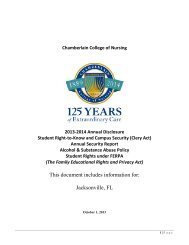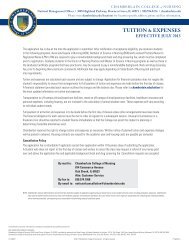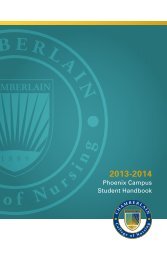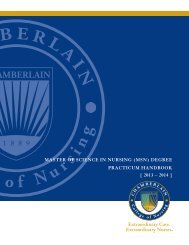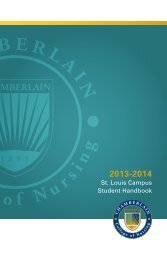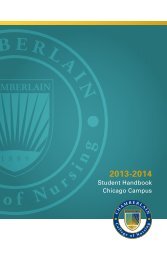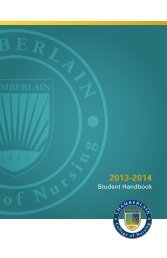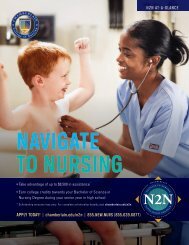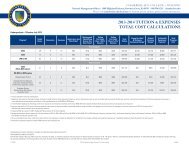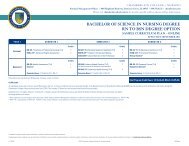Chamberlain College of Nursing Texas Board of Nursing Required
Chamberlain College of Nursing Texas Board of Nursing Required
Chamberlain College of Nursing Texas Board of Nursing Required
You also want an ePaper? Increase the reach of your titles
YUMPU automatically turns print PDFs into web optimized ePapers that Google loves.
chamberlain.edu/texasdisclosureNational Management Offices – 3005 Highland Parkway, Downers Grove, IL 60515 National Toll-free 888.556.8226 | chamberlain.edu<strong>Chamberlain</strong> <strong>College</strong> <strong>of</strong> <strong>Nursing</strong><strong>Texas</strong> <strong>Board</strong> <strong>of</strong> <strong>Nursing</strong> <strong>Required</strong> DisclosureDeclaratory Order <strong>of</strong> EligibilitySuccessful completion <strong>of</strong> the nursing education program at <strong>Chamberlain</strong> <strong>College</strong> <strong>of</strong> <strong>Nursing</strong> is only one step in a student’s eligibility to takethe NCLEX-RN ® exam. Applicants for licensure as a pr<strong>of</strong>essional nurse must be <strong>of</strong> good pr<strong>of</strong>essional character, without criminal <strong>of</strong>fenses,sober, and fit. State <strong>Board</strong>s <strong>of</strong> <strong>Nursing</strong> have varying processes for determination <strong>of</strong> the applicant’s eligibility for licensure. The purpose <strong>of</strong> thisdocument is to provide <strong>Chamberlain</strong> <strong>College</strong> <strong>of</strong> <strong>Nursing</strong> students information about eligibility for licensure in <strong>Texas</strong> and the option to petitionfor the <strong>Texas</strong> <strong>Board</strong> <strong>of</strong> <strong>Nursing</strong> (<strong>Board</strong>) for a Declaratory Order <strong>of</strong> Eligibility.The Declaratory Order <strong>of</strong> Eligibility allows a person enrolled or planning to enroll in a nursing education program who has reason to believe thathe or she may not be eligible for licensure as a pr<strong>of</strong>essional nurse in <strong>Texas</strong> to petition the <strong>Board</strong> for a declaratory order as to his or her eligibility.Your admissions advisor will review the information in this document with you and you will have the opportunity to ask questions and considerthe information prior to signing the acknowledgement.This document and the discussion with your admissions advisor about the document and the rule are being provided in response to Rule215.8(b) <strong>of</strong> the <strong>Texas</strong> Administrative Code (TAC)ADDITIONAL INFORMATIONAdditional information about the requirements for licensure as a registered nurse in <strong>Texas</strong> may be accessed on the <strong>Board</strong> website. The followingweblinks provide specific information about licensure:• <strong>Texas</strong> <strong>Board</strong> <strong>of</strong> <strong>Nursing</strong> Home Page: http://www.bon.state.tx.us/index.html• Students/Prospective Students Frequently Asked Questions: http://www.bon.state.tx.us/nursingeducation/faq_students.html• <strong>Texas</strong> Licensee and Other Forms: http://www.bon.state.tx.us/olv/forms.html#License• Declaratory Order Form: http://www.bon.state.tx.us/olv/pdfs/DOapp.pdf• <strong>Texas</strong> <strong>Nursing</strong> Practice Act and <strong>Board</strong> Rules: http://www.bon.state.tx.us/nursinglaw/Rule 215.8(b) <strong>of</strong> the <strong>Texas</strong> Administrative Code (TAC) provides the following:(b) Individuals enrolled in approved pr<strong>of</strong>essional nursing educational programs preparing students for initial licensure shall be providedverbal and written information regarding conditions that may disqualify graduates from licensure and <strong>of</strong> their rights to petition the<strong>Board</strong> for a Declaratory Order <strong>of</strong> Eligibility. <strong>Required</strong> eligibility information includes:(1) <strong>Texas</strong> Occupations Code §§301.252, 301.257 and 301.452 - 301.469; and(2) Sections 213.27 - 213.30 <strong>of</strong> this title (relating to Good Pr<strong>of</strong>essional Character, Licensure <strong>of</strong> Persons with Criminal Offenses,Criteria and Procedure Regarding Intemperate Use and Lack <strong>of</strong> Fitness in Eligibility and Disciplinary Matters, DeclaratoryOrder <strong>of</strong> Eligibility for Licensure).Section 301.252 <strong>of</strong> the <strong>Texas</strong> Occupations Code (TOC), provides the following:Sec. 301.252. LICENSE APPLICATION.(a) Each applicant for a registered nurse license or a vocational nurse license must submit to the board a sworn application that demonstratesthe applicant’s qualifications under this chapter, accompanied by evidence that the applicant:(1) has good pr<strong>of</strong>essional character;(2) has successfully completed a program <strong>of</strong> pr<strong>of</strong>essional or vocational nursing education approved under Section 301.157(d); and(3) has passed the jurisprudence examination approved by the board as provided by Subsection (a-1).(a-1) The jurisprudence examination shall be conducted on the licensing requirements under this chapter and board rules and other laws,rules, or regulations applicable to the nursing pr<strong>of</strong>ession in this state. The board shall adopt rules for the jurisprudence examinationunder Subsection (a)(3) regarding:(1) the development <strong>of</strong> the examination;(2) applicable fees;(3) administration <strong>of</strong> the examination;(4) reexamination procedures;(5) grading procedures; and(6) notice <strong>of</strong> results.(b) The board may waive the requirement <strong>of</strong> Subsection (a)(2) for a vocational nurse applicant if the applicant provides satisfactory swornevidence that the applicant has completed an acceptable level <strong>of</strong> education in:(1) a pr<strong>of</strong>essional nursing school approved under Section 301.157(d); or(2) a school <strong>of</strong> pr<strong>of</strong>essional nurse education located in another state or a foreign country.(c) The board by rule shall determine acceptable levels <strong>of</strong> education under Subsection (b).12-100669 ©2010 <strong>Chamberlain</strong> <strong>College</strong> <strong>of</strong> <strong>Nursing</strong> LLC. All rights reserved. 1210ccnlcp1m
Section 301.257 <strong>of</strong> the TOC provides the following:Sec. 301.257. DECLARATORY ORDER OF LICENSE ELIGIBILITY.(a) A person may petition the board for a declaratory order as to the person’s eligibility for a license under this chapter if the person hasreason to believe that the person is ineligible for the license and:(1) is enrolled or planning to enroll in an educational program that prepares a person for an initial license as a registered nurse orvocational nurse; or(2) is an applicant for a license.(b) The petition must state the basis for the person’s potential ineligibility.(c) The board has the same powers to investigate the petition and the person’s eligibility that it has to investigate a person applying for a license.(d) The petitioner or the board may amend the petition to include additional grounds for potential ineligibility at any time before a finaldetermination is made.(e) If the board determines that a ground for ineligibility does not exist, instead <strong>of</strong> issuing an order, the board shall notify the petitioner inwriting <strong>of</strong> the board’s determination on each ground <strong>of</strong> potential ineligibility. If the board proposes to find that the petitioner is ineligiblefor a license, the petitioner is entitled to a hearing before the State Office <strong>of</strong> Administrative Hearings.(f) The board’s order must set out each basis for potential ineligibility and the board’s determination as to eligibility. In the absence <strong>of</strong> new evidenceknown to but not disclosed by the petitioner or not reasonably available to the board at the time the order is issued, the board’s ruling on thepetition determines the person’s eligibility with respect to the grounds for potential ineligibility set out in the written notice or order.(g) The board may require an individual accepted for enrollment or enrolled in an educational program preparing a student for initiallicensure as a registered nurse or vocational nurse to submit information to the board to permit the board to determine whether theperson is aware <strong>of</strong> the conditions that may disqualify the person from licensure as a registered nurse or vocational nurse on graduationand <strong>of</strong> the person’s right to petition the board for a declaratory order under this section. Instead <strong>of</strong> requiring the person to submit theinformation, the board may require the educational program to collect and submit the information on each person accepted for enrollmentor enrolled in the program.(h) The information required under Subsection (g) must be submitted in a form approved by the board.(i) If, as a result <strong>of</strong> information provided under Subsection (g), the board determines that a person may not be eligible for a license ongraduation, the board shall notify the educational program <strong>of</strong> its determination.Section 301.452 <strong>of</strong> the TOC provides the following:Sec. 301.452. GROUNDS FOR DISCIPLINARY ACTION.(a) In this section, “intemperate use” includes practicing nursing or being on duty or on call while under the influence <strong>of</strong> alcohol or drugs.(b) A person is subject to denial <strong>of</strong> a license or to disciplinary action under this subchapter for:(1) a violation <strong>of</strong> this chapter, a rule or regulation not inconsistent with this chapter, or an order issued under this chapter;(2) fraud or deceit in procuring or attempting to procure a license to practice pr<strong>of</strong>essional nursing or vocational nursing;(3) a conviction for, or placement on deferred adjudication community supervision or deferred disposition for, a felony or for amisdemeanor involving moral turpitude;(4) conduct that results in the revocation <strong>of</strong> probation imposed because <strong>of</strong> conviction for a felony or for a misdemeanor involvingmoral turpitude;(5) use <strong>of</strong> a nursing license, diploma, or permit, or the transcript <strong>of</strong> such a document, that has been fraudulently purchased, issued,counterfeited, or materially altered;(6) impersonating or acting as a proxy for another person in the licensing examination required under Section 301.253 or 301.255;(7) directly or indirectly aiding or abetting an unlicensed person in connection with the unauthorized practice <strong>of</strong> nursing;(8) revocation, suspension, or denial <strong>of</strong>, or any other action relating to, the person’s license or privilege to practice nursingin another jurisdiction;(9) intemperate use <strong>of</strong> alcohol or drugs that the board determines endangers or could endanger a patient;(10) unpr<strong>of</strong>essional or dishonorable conduct that, in the board’s opinion, is likely to deceive, defraud, or injure a patient or the public;(11) adjudication <strong>of</strong> mental incompetency;(12) lack <strong>of</strong> fitness to practice because <strong>of</strong> a mental or physical health condition that could result in injury to a patient or the public; or(13) failure to care adequately for a patient or to conform to the minimum standards <strong>of</strong> acceptable nursing practice in a manner that,in the board’s opinion, exposes a patient or other person unnecessarily to risk <strong>of</strong> harm.(c) The board may refuse to admit a person to a licensing examination for a ground described under Subsection (b).(d) The board by rule shall establish guidelines to ensure that any arrest information, in particular information on arrests in which criminalaction was not proven or charges were not filed or adjudicated, that is received by the board under this section is used consistently,fairly, and only to the extent the underlying conduct relates to the practice <strong>of</strong> nursing.Section 301.4521 <strong>of</strong> the TOC provides the following:Sec. 301.4521. PHYSICAL AND PSYCHOLOGICAL EVALUATION.(a) In this section:(1) “Applicant” means:(A) a petitioner for a declaratory order <strong>of</strong> eligibility for a license; or(B) an applicant for an initial license or renewal <strong>of</strong> a license.(2) “Evaluation” means a physical or psychological evaluation conducted to determine a person’s fitness to practice nursing.(b) The board may require a nurse or applicant to submit to an evaluation only if the board has probable cause to believe that the nurse orapplicant is unable to practice nursing with reasonable skill and safety to patients because <strong>of</strong>:(1) physical impairment;(2) mental impairment; or(3) chemical dependency or abuse <strong>of</strong> drugs or alcohol.(c) A demand for an evaluation under Subsection (b) must be in writing and state:(1) the reasons probable cause exists to require the evaluation; and(2) that refusal by the nurse or applicant to submit to the evaluation will result in an administrative hearing to be held to make a finaldetermination <strong>of</strong> whether probable cause for the evaluation exists.(d) If the nurse or applicant refuses to submit to the evaluation, the board shall schedule a hearing on the issue <strong>of</strong> probable cause to beconducted by the State Office <strong>of</strong> Administrative Hearings. The nurse or applicant must be notified <strong>of</strong> the hearing by personal service or
certified mail. The hearing is limited to the issue <strong>of</strong> whether the board had probable cause to require an evaluation. The nurse or applicantmay present testimony and other evidence at the hearing to show why the nurse or applicant should not be required to submitto the evaluation. The board has the burden <strong>of</strong> proving that probable cause exists. At the conclusion <strong>of</strong> the hearing, the hearing <strong>of</strong>ficershall enter an order requiring the nurse or applicant to submit to the evaluation or an order rescinding the board’s demand for anevaluation. The order may not be vacated or modified under Section 2001.058, Government Code.(e) If a nurse or applicant refuses to submit to an evaluation after an order requiring the evaluation is entered under Subsection (d), the board may:(1) refuse to issue or renew a license;(2) suspend a license; or(3) issue an order limiting the license.(f) The board may request a nurse or applicant to consent to an evaluation by a practitioner approved by the board for a reason other thana reason listed in Subsection (b). A request for an evaluation under this subsection must be in writing and state:(1) the reasons for the request;(2) the type <strong>of</strong> evaluation requested;(3) how the board may use the evaluation;(4) that the nurse or applicant may refuse to submit to an evaluation; and(5) the procedures for submitting an evaluation as evidence in any hearing regarding the issuance or renewal <strong>of</strong> the nurse’sor applicant’s license.(g) If a nurse or applicant refuses to consent to an evaluation under Subsection (f), the nurse or applicant may not introduce an evaluation intoevidence at a hearing to determine the nurse’s or applicant’s right to be issued or retain a nursing license unless the nurse or applicant:(1) not later than the 30th day before the date <strong>of</strong> the hearing, notifies the board that an evaluation will be introduced into evidenceat the hearing;(2) provides the board the results <strong>of</strong> that evaluation;(3) informs the board <strong>of</strong> any other evaluations by any other practitioners; and(4) consents to an evaluation by a practitioner that meets board standards established under Subsection (h).(h) The board shall establish by rule the qualifications for a licensed practitioner to conduct an evaluation under this section. The boardshall maintain a list <strong>of</strong> qualified practitioners. The board may solicit qualified practitioners located throughout the state to be on the list.(i) A nurse or applicant shall pay the costs <strong>of</strong> an evaluation conducted under this section.(j) The results <strong>of</strong> an evaluation under this section are:(1) confidential and not subject to disclosure under Chapter 552, Government Code; and(2) not subject to disclosure by discovery, subpoena, or other means <strong>of</strong> legal compulsion for release to anyone, except that theresults may be:(A) introduced as evidence in a proceeding before the board or a hearing conducted by the State Office <strong>of</strong> AdministrativeHearings under this chapter; or(B) included in the findings <strong>of</strong> fact and conclusions <strong>of</strong> law in a final board order.(k) If the board determines there is insufficient evidence to bring action against a person based on the results <strong>of</strong> any evaluation under thissection, the evaluation must be expunged from the board’s records.(l) The board shall adopt guidelines for requiring or requesting a nurse or applicant to submit to an evaluation under this section.(m)The authority granted to the board under this section is in addition to the board’s authority to make licensing decisions under this chapter.Section 301.453 <strong>of</strong> the TOC provides the following:Sec. 301.453. DISCIPLINARY AUTHORITY OF BOARD; METHODS OF DISCIPLINE.(a) If the board determines that a person has committed an act listed in Section 301.452(b), the board shall enter an order imposing oneor more <strong>of</strong> the following:(1) denial <strong>of</strong> the person’s application for a license, license renewal, or temporary permit;(2) issuance <strong>of</strong> a written warning;(3) administration <strong>of</strong> a public reprimand;(4) limitation or restriction <strong>of</strong> the person’s license, including:(A) limiting to or excluding from the person’s practice one or more specified activities <strong>of</strong> nursing; or(B) stipulating periodic board review;(5) suspension <strong>of</strong> the person’s license;(6) revocation <strong>of</strong> the person’s license; or(7) assessment <strong>of</strong> a fine.(b) In addition to or instead <strong>of</strong> an action under Subsection (a), the board, by order, may require the person to:(1) submit to care, counseling, or treatment by a health provider designated by the board as a condition for the issuance or renewal<strong>of</strong> a license;(2) participate in a program <strong>of</strong> education or counseling prescribed by the board, including a program <strong>of</strong> remedial education;(3) practice for a specified period under the direction <strong>of</strong> a registered nurse or vocational nurse designated by the board; or(4) perform public service the board considers appropriate.(c) The board may probate any penalty imposed on a nurse and may accept the voluntary surrender <strong>of</strong> a license. The board may notreinstate a surrendered license unless it determines that the person is competent to resume practice.(d) If the board suspends, revokes, or accepts surrender <strong>of</strong> a license, the board may impose conditions for reinstatement that the personmust satisfy before the board may issue an unrestricted license.Section 301.4531 <strong>of</strong> the TOC provides the following:Sec. 301.4531. SCHEDULE OF SANCTIONS.(a) The board by rule shall adopt a schedule <strong>of</strong> the disciplinary sanctions that the board may impose under this chapter. In adopting theschedule <strong>of</strong> sanctions, the board shall ensure that the severity <strong>of</strong> the sanction imposed is appropriate to the type <strong>of</strong> violation or conductthat is the basis for disciplinary action.(b) In determining the appropriate disciplinary action, including the amount <strong>of</strong> any administrative penalty to assess, the board shall consider:(1) whether the person:(A) is being disciplined for multiple violations <strong>of</strong> either this chapter or a rule or order adopted under this chapter; or(B) has previously been the subject <strong>of</strong> disciplinary action by the board and has previously complied with board rules andthis chapter;
(c) The State Office <strong>of</strong> Administrative Hearings shall hold a preliminary hearing not later than the 14th day after the date <strong>of</strong> the temporarysuspension or restriction to determine whether probable cause exists that a continuing and imminent threat to the public welfare exists.The probable cause hearing shall be conducted as a de novo hearing.(d) A final hearing on the matter shall be held not later than the 61st day after the date <strong>of</strong> the temporary suspension or restriction.Section 301.4551 <strong>of</strong> the TOC provides the following:Sec. 301.4551. TEMPORARY LICENSE SUSPENSION FOR DRUG OR ALCOHOL USE. The board shall temporarily suspend the license <strong>of</strong> anurse as provided by Section 301.455 if the nurse is under a board order prohibiting the use <strong>of</strong> alcohol or a drug or requiring the nurse toparticipate in a peer assistance program, and the nurse:(1) tests positive for alcohol or a prohibited drug;(2) refuses to comply with a board order to submit to a drug or alcohol test; or(3) fails to participate in the peer assistance program and the program issues a letter <strong>of</strong> dismissal and referral to the board for noncompliance.Section 301.456 <strong>of</strong> the TOC provides the following:Sec. 301.456. EVIDENCE. A certified copy <strong>of</strong> the order <strong>of</strong> the denial, suspension, or revocation or other action under Section 301.452(b)(8)is conclusive evidence <strong>of</strong> that action.Section 301.457 <strong>of</strong> the TOC provides the following:Sec. 301.457. COMPLAINT AND INVESTIGATION.(a) The board or any person may initiate a proceeding under this subchapter by filing with the board a complaint against a nurse. Thecomplaint must be in writing and signed by the complainant.(b) Except as otherwise provided by this section, the board or a person authorized by the board shall conduct each investigation. Eachcomplaint against a nurse that requires a determination <strong>of</strong> nursing competency shall be reviewed by a board member, consultant, oremployee with a nursing background the board considers sufficient.(c) On the filing <strong>of</strong> a complaint, the board:(1) may conduct a preliminary investigation into the identity <strong>of</strong> the nurse named or described in the complaint;(2) shall make a timely and appropriate preliminary investigation <strong>of</strong> the complaint; and(3) may issue a warning or reprimand to the nurse.(d) After any preliminary investigation to determine the identity <strong>of</strong> the subject <strong>of</strong> the complaint, unless it would jeopardize an investigation,the board shall notify the nurse that a complaint has been filed and the nature <strong>of</strong> the complaint. If the investigation reveals probablecause to take further disciplinary action, the board shall either attempt an informal disposition <strong>of</strong> the complaint or file a formal chargeagainst the nurse stating the provision <strong>of</strong> this chapter or board rule that is alleged to have been violated and a brief description <strong>of</strong> eachact or omission that constitutes the violation.(e) The board shall conduct an investigation <strong>of</strong> the complaint to determine:(1) whether the nurse’s continued practice <strong>of</strong> nursing poses a risk <strong>of</strong> harm to clients or other persons; and(2) whether probable cause exists that a nurse committed an act listed in Section 301.452(b) or that violates other law.(f) In making a determination under Subsection (e), the board shall review the evidence to determine the extent to which a deficiency incare by the registered nurse was the result <strong>of</strong> deficiencies in the registered nurse’s judgment, knowledge, training, or skill rather thanother factors beyond the nurse’s control. A determination that a deficiency in care is attributable to a registered nurse must be basedon the extent to which the registered nurse’s conduct was the result <strong>of</strong> a deficiency in the registered nurse’s judgment, knowledge,training, or skill.(g) If the board determines after investigating a complaint under Subsection (e) that there is reason to believe that a nurse’s deficiency in carewas the result <strong>of</strong> a factor beyond the nurse’s control, the board shall report that determination to the patient safety committee at the facilitywhere the nurse’s deficiency in care occurred, or if the facility does not have a patient safety committee, to the chief nursing <strong>of</strong>ficer.Section 301.458 <strong>of</strong> the TOC provides the following:Sec. 301.458. INITIATION OF FORMAL CHARGES; DISCOVERY.(a) Unless there is an agreed disposition <strong>of</strong> the complaint under Section 301.463, and if probable cause is found under Section 301.457(e)(2), the board or the board’s authorized representative shall initiate proceedings by filing formal charges against the nurse.(b) A formal charge must:(1) be written;(2) be specific enough to enable a person <strong>of</strong> common understanding to know what is meant by the formal charge; and(3) contain a degree <strong>of</strong> certainty that gives the person who is the subject <strong>of</strong> the formal charge notice <strong>of</strong> each particular act alleged toviolate a specific statute, board rule, or board order.(c) A copy <strong>of</strong> the formal charge shall be served on the nurse or the nurse’s counsel <strong>of</strong> record.(d) The board shall adopt reasonable rules to promote discovery by each party to a contested case.Section 301.459 <strong>of</strong> the TOC provides the following:Sec. 301.459. FORMAL HEARING.(a) The board by rule shall adopt procedures under Chapter 2001, Government Code, governing formal disposition <strong>of</strong> a contested case.The State Office <strong>of</strong> Administrative Hearings shall conduct a formal hearing.(b) In any hearing under this section, a nurse is entitled to appear in person or by counsel.Section 301.460 <strong>of</strong> the TOC provides the following:Sec. 301.460. ACCESS TO INFORMATION.(a) Except for good cause shown for delay and subject to any other privilege or restriction set forth by statute, rule, or legal precedent, theboard shall, not later than the 30th day after the date the board receives a written request from a license holder who is the subject <strong>of</strong> aformal charge filed under Section 301.458 or from the license holder’s counsel <strong>of</strong> record, provide the license holder with access to:(1) all known exculpatory information in the board’s possession; and(2) information in the board’s possession that the board intends to <strong>of</strong>fer into evidence in presenting its case in chief at the contestedhearing on the complaint.
(b) The board is not required to provide:(1) board investigative reports or investigative memoranda;(2) the identity <strong>of</strong> nontestifying complainants;(3) attorney-client communications;(4) attorney work product; or(5) other materials covered by a privilege as recognized by the <strong>Texas</strong> Rules <strong>of</strong> Civil Procedure or the <strong>Texas</strong> Rules <strong>of</strong> Evidence.(c) The provision <strong>of</strong> information under Subsection (a) does not constitute a waiver <strong>of</strong> privilege or confidentiality under this chapter orother applicable law.Section 301.461 <strong>of</strong> the TOC provides the following:Sec. 301.461. ASSESSMENT OF COSTS. The board may assess a person who is found to have violated this chapter the administrativecosts <strong>of</strong> conducting a hearing to determine the violation.Section 301.462 <strong>of</strong> the TOC provides the following:Sec. 301.462. VOLUNTARY SURRENDER OF LICENSE. The board may revoke a nurse’s license without formal charges, notice, or opportunity<strong>of</strong> hearing if the nurse voluntarily surrenders the nurse’s license to the board and executes a sworn statement that the nurse does notdesire to be licensed.Section 301.463 <strong>of</strong> the TOC provides the following:Sec. 301.463. AGREED DISPOSITION.(a) Unless precluded by this chapter or other law, the board may dispose <strong>of</strong> a complaint by:(1) stipulation;(2) agreed settlement;(3) agreed order; or(4) dismissal.(b) An agreed disposition <strong>of</strong> a complaint is considered to be a disciplinary order for purposes <strong>of</strong> reporting under this chapter and anadministrative hearing and proceeding by a state or federal regulatory agency regarding the practice <strong>of</strong> nursing.(c) An agreed order is a public record.(d) In civil or criminal litigation an agreed disposition is a settlement agreement under Rule 408, <strong>Texas</strong> Rules <strong>of</strong> Evidence.Section 301.464 <strong>of</strong> the TOC provides the following:Sec. 301.464. INFORMAL PROCEEDINGS.(a) The board by rule shall adopt procedures governing:(1) informal disposition <strong>of</strong> a contested case under Section 2001.056, Government Code; and(2) an informal proceeding held in compliance with Section 2001.054, Government Code.(b) Rules adopted under this section must:(1) provide the complainant and the license holder an opportunity to be heard; and(2) require the presence <strong>of</strong> a representative <strong>of</strong> the board’s legal staff or <strong>of</strong> the attorney general to advise the board or the board’s employees.Section 301.465 <strong>of</strong> the TOC provides the following:Sec. 301.465. SUBPOENAS; REQUEST FOR INFORMATION.(a) The board may request issuance <strong>of</strong> a subpoena to be served in any manner authorized by law, including personal service by a boardinvestigator and service by certified mail.(b) Each person shall respond promptly and fully to a request for information by the board or to a subpoena issued by the board. Arequest or subpoena may not be refused, denied, or resisted unless the request or subpoena calls for information within the attorneyclientprivilege. No other privilege applies to a board proceeding.(c) The board may pay a reasonable fee for photocopies subpoenaed at the board’s request. The amount paid may not exceed the amountthe board charges for copies <strong>of</strong> its records.(d) The board shall protect, to the extent possible, the identity <strong>of</strong> each patient named in information received by the board.Section 301.466 <strong>of</strong> the TOC provides the following:Sec. 301.466. CONFIDENTIALITY.(a) A complaint and investigation concerning a nurse under this subchapter and all information and material compiled by the board inconnection with the complaint and investigation are:(1) confidential and not subject to disclosure under Chapter 552, Government Code; and(2) not subject to disclosure, discovery, subpoena, or other means <strong>of</strong> legal compulsion for release to anyone other than the board ora board employee or agent involved in license holder discipline.(b) Notwithstanding Subsection (a), information regarding a complaint and an investigation may be disclosed to:(1) a person involved with the board in a disciplinary action against the nurse;(2) a nursing licensing or disciplinary board in another jurisdiction;(3) a peer assistance program approved by the board under Chapter 467, Health and Safety Code;(4) a law enforcement agency; or(5) a person engaged in bona fide research, if all information identifying a specific individual has been deleted.(c) The filing <strong>of</strong> formal charges against a nurse by the board, the nature <strong>of</strong> those charges, disciplinary proceedings <strong>of</strong> the board, and finaldisciplinary actions, including warnings and reprimands, by the board are not confidential and are subject to disclosure in accordancewith Chapter 552, Government Code.
Section 301.467 <strong>of</strong> the TOC provides the following:Sec. 301.467. REINSTATEMENT.(a) On application, the board may reinstate a license to practice pr<strong>of</strong>essional nursing or vocational nursing to a person whose license hasbeen revoked, suspended, or surrendered.(b) An application to reinstate a revoked license:(1) may not be made before the first anniversary <strong>of</strong> the date <strong>of</strong> the revocation; and(2) must be made in the manner and form the board requires.(c) If the board denies an application for reinstatement, it may set a reasonable waiting period before the applicant may reapply for reinstatement.Section 301.468 <strong>of</strong> the TOC provides the following:Sec. 301.468. PROBATION.(a) The board may determine that an order denying a license application or suspending a license be probated. A person subject to aprobation order shall conform to each condition the board sets as the terms <strong>of</strong> probation, including a condition:(1) limiting the practice <strong>of</strong> the person to, or excluding, one or more specified activities <strong>of</strong> pr<strong>of</strong>essional nursing or vocational nursing;(2) requiring the person to submit to supervision, care, counseling, or treatment by a practitioner designated by the board; or(3) requiring the person to submit to random drug or alcohol tests in the manner prescribed by the board.(b) At the time the probation is granted, the board shall establish the term <strong>of</strong> the probationary period.(c) At any time while the person remains subject to the probation order, the board may hold a hearing and rescind the probation and enforcethe board’s original action in denying or suspending the license. The hearing shall be called by the presiding <strong>of</strong>ficer <strong>of</strong> the board, who shallissue a notice to be served on the person or the person’s counsel not later than the 20th day before the date scheduled for the hearing that:(1) sets the time and place for the hearing; and(2) contains the charges or complaints against the probationer.(d) Notice under Subsection (c) is sufficient if sent by registered or certified mail to the affected person at the person’s most recent addressas shown in the board’s records.(e) A hearing under this section is limited to a determination <strong>of</strong> whether the person violated the terms <strong>of</strong> the probation order underSubsection (a) and whether the board should:(1) continue, rescind, or modify the terms <strong>of</strong> probation, including imposing an administrative penalty; or(2) enter an order denying, suspending, or revoking the person’s license.(f) If one <strong>of</strong> the conditions <strong>of</strong> probation is the prohibition <strong>of</strong> using alcohol or a drug or participation in a peer assistance program, violation<strong>of</strong> that condition is established by:(1) a positive drug or alcohol test result;(2) refusal to submit to a drug or alcohol test as required by the board; or(3) a letter <strong>of</strong> noncompliance from the peer assistance program.Section 301.469 <strong>of</strong> the TOC provides the following:Sec. 301.469. NOTICE OF FINAL ACTION. If the board takes a final disciplinary action, including a warning or reprimand, against a nurse underthis subchapter, the board shall immediately send a copy <strong>of</strong> the board’s final order to the nurse and to the last known employer <strong>of</strong> the nurse.Rule 213.27 <strong>of</strong> the TAC defines Good Pr<strong>of</strong>essional Character, and provides the following:(a) Good pr<strong>of</strong>essional character is the integrated pattern <strong>of</strong> personal, academic and occupational behaviors which, in the judgment <strong>of</strong> the<strong>Board</strong>, indicates that an individual is able to consistently conform his or her conduct to the requirements <strong>of</strong> the <strong>Nursing</strong> Practice Act, the<strong>Board</strong>’s rules and regulations, and generally accepted standards <strong>of</strong> nursing practice including, but not limited to, behaviors indicatinghonesty, accountability, trustworthiness, reliability, and integrity.(b) Factors to be used in evaluating good pr<strong>of</strong>essional character in eligibility and disciplinary matters are:(1) Good pr<strong>of</strong>essional character is determined through the evaluation <strong>of</strong> behaviors demonstrated by an individual in his or her personal,academic and occupational history. An individual’s age, education, and experience necessarily affect the nature and extent <strong>of</strong>behavioral history and, therefore, shall be considered in each evaluation.(2) A person who seeks to obtain or retain a license to practice pr<strong>of</strong>essional or vocational nursing shall provide evidence <strong>of</strong> goodpr<strong>of</strong>essional character which, in the judgment <strong>of</strong> the <strong>Board</strong>, is sufficient to insure that the individual can consistently act in thebest interest <strong>of</strong> patients/clients and the public in any practice setting. Such evidence shall establish that the person:(A) is able to distinguish right from wrong;(B) is able to think and act rationally;(C) is able to keep promises and honor obligations;(D) is accountable for his or her own behavior;(E) is able to practice nursing in an autonomous role with patients/clients, their families, significant others, and members <strong>of</strong>the public who are or who may become physically, emotionally, or financially vulnerable;(F) is able to recognize and honor the interpersonal boundaries appropriate to any therapeutic relationship or health caresetting; and(G) is able to promptly and fully self-disclose facts, circumstances, events, errors, and omissions when such disclosurecould enhance the health status <strong>of</strong> patients/clients or the public or could protect patients/clients or the public fromunnecessary risk <strong>of</strong> harm.(3) Any conviction for a felony or for a misdemeanor involving moral turpitude or order <strong>of</strong> probation with or without an adjudication<strong>of</strong> guilt for an <strong>of</strong>fense that would be a felony or misdemeanor involving moral turpitude if guilt were adjudicated.(4) Any revocation, suspension, or denial <strong>of</strong>, or any other adverse action relating to, the person’s license or privilege to practice nursingin another jurisdiction.(c) The following provisions shall govern the determination <strong>of</strong> present good pr<strong>of</strong>essional character and fitness <strong>of</strong> a Petitioner, Applicant,or Licensee who has been convicted <strong>of</strong> a felony in <strong>Texas</strong> or placed on probation for a felony with or without an adjudication <strong>of</strong> guiltin <strong>Texas</strong>, or who has been convicted or placed on probation with or without an adjudication <strong>of</strong> guilt in another jurisdiction for a crimewhich would be a felony in <strong>Texas</strong>. A Petitioner, Applicant, or Licensee may be found lacking in present good pr<strong>of</strong>essional character andfitness under this rule based on the underlying facts <strong>of</strong> a felony conviction or deferred adjudication, as well as based on the convictionor probation through deferred adjudication itself.
(1) The record <strong>of</strong> conviction or order <strong>of</strong> deferred adjudication is conclusive evidence <strong>of</strong> guilt.(2) In addition to the disciplinary remedies available to the <strong>Board</strong> pursuant to Tex. Occ. Code Ann. §301.452(b)(3) and (4), <strong>Texas</strong>Occupations Code chapter 53, and §213.28, a licensee guilty <strong>of</strong> a felony under this rule is conclusively deemed to have violatedTex. Occ. Code Ann. §301.452(b)(10) and is subject to appropriate discipline, up to and including revocation.(d) The following provisions shall govern the determination <strong>of</strong> present good pr<strong>of</strong>essional character and fitness <strong>of</strong> a Petitioner, Applicant,or Licensee who has been licensed to practice nursing in any jurisdiction and has been disciplined, or allowed to voluntarily surrenderin lieu <strong>of</strong> discipline, in that jurisdiction.(1) A certified copy <strong>of</strong> the order, judgment <strong>of</strong> discipline, or order <strong>of</strong> adverse licensure action from the jurisdiction is prima facieevidence <strong>of</strong> the matters contained in such order, judgment, or adverse action and is conclusive evidence that the individual inquestion has committed pr<strong>of</strong>essional misconduct as alleged in such order <strong>of</strong> judgment.(2) An individual disciplined for pr<strong>of</strong>essional misconduct in the course <strong>of</strong> practicing nursing in any jurisdiction or an or an individualwho resigned in lieu <strong>of</strong> disciplinary action (disciplined individual) is deemed not to have present good pr<strong>of</strong>essional character andfitness and is, therefore, ineligible to file an Application for Endorsement to the <strong>Texas</strong> <strong>Board</strong> <strong>of</strong> <strong>Nursing</strong> during the period <strong>of</strong> suchdiscipline imposed by such jurisdiction, and in the case <strong>of</strong> revocation or surrender in lieu <strong>of</strong> disciplinary action, until the disciplinedindividual has filed an application for reinstatement in the disciplining jurisdiction and obtained a final determination on that application.(3) The only defenses available to a Petitioner, Applicant, or Licensee under section are outlined below and must be proved by clearand convincing evidence:(A) The procedure followed in the disciplining jurisdiction was so lacking in notice or opportunity to be heard as to constitutea deprivation <strong>of</strong> due process.(B) There was such an infirmity <strong>of</strong> pro<strong>of</strong> establishing the misconduct in the other jurisdiction as to give rise to the clearconviction that the <strong>Board</strong>, consistent with its duty, should not accept as final the conclusion on the evidence reached inthe disciplining jurisdiction.(C) The deeming <strong>of</strong> lack <strong>of</strong> present good pr<strong>of</strong>essional character and fitness by the <strong>Board</strong> during the period required underthe provisions <strong>of</strong> section (d) would result in grave injustice.(D) The misconduct for which the individual was disciplined does not constitute pr<strong>of</strong>essional misconduct in <strong>Texas</strong>.(4) If the <strong>Board</strong> determines that one or more <strong>of</strong> the foregoing defenses has been established, it shall render such orders as it deemsnecessary and appropriate.(e) An individual who applies for initial licensure, reinstatement, renewal, or endorsement to practice pr<strong>of</strong>essional or vocational nursingin <strong>Texas</strong> after the expiration <strong>of</strong> the three-year period in subsection (f) <strong>of</strong> this section, or after the completion <strong>of</strong> the disciplinary periodassessed or ineligibility period imposed by any jurisdiction under subsection (d) <strong>of</strong> this section shall be required to prove, by apreponderance <strong>of</strong> the evidence:(1) that the best interest <strong>of</strong> the public and the pr<strong>of</strong>ession, as well as the ends <strong>of</strong> justice, would be served by his or her admission topractice nursing; and(2) that (s)he is <strong>of</strong> present good pr<strong>of</strong>essional character and fitness.(f) An individual who applies for initial licensure, reinstatement, renewal, or endorsement to practice pr<strong>of</strong>essional or vocational nursing in<strong>Texas</strong> after a negative determination based on a felony conviction, felony probation with or without an adjudication <strong>of</strong> guilt, or pr<strong>of</strong>essionalmisconduct, or voluntary surrender in lieu <strong>of</strong> disciplinary action and whose application or petition is denied and not appealed is noteligible to file another petition or application for licensure until after the expiration <strong>of</strong> three years from the date <strong>of</strong> the <strong>Board</strong>’s orderdenying the preceding petition for licensure.(g) The following disciplinary and eligibility sanction policies and guidelines shall be used by the Executive Director, the State Office <strong>of</strong>Administrative Hearings (SOAH), or the <strong>Board</strong> in evaluating good pr<strong>of</strong>essional character in eligibility and disciplinary matters:(1) Disciplinary Sanctions for Fraud, Theft and Deception approved by the <strong>Board</strong> and published on February 22, 2008 in the <strong>Texas</strong>Register (33 TexReg 1646) and available on the <strong>Board</strong>’s website at http://www.bon.state.tx.us/disciplinaryaction/dsp.html.(2) Disciplinary Sanctions for Lying and Falsification approved by the <strong>Board</strong> and published on February 22, 2008 in the <strong>Texas</strong> Register(33 TexReg 1647) and available on the <strong>Board</strong>’s website at http://www.bon.state.tx.us/disciplinaryaction/dsp.html.(3) Disciplinary Sanctions for Sexual Misconduct approved by the <strong>Board</strong> and published on February 22, 2008 in the <strong>Texas</strong> Register(33 TexReg 1649) and available on the <strong>Board</strong>’s website at http://www.bon.state.tx.us/disciplinaryaction/dsp.html.(4) Eligibility and Disciplinary Sanctions for Nurses with Substance Abuse, Misuse, Substance Dependency, or other Substance UseDisorder and published on February 22, 2008 in the <strong>Texas</strong> Register (33 TexReg 1651) and available on the <strong>Board</strong>’s website athttp://www.bon.state.tx.us/disciplinaryaction/dsp.html.(5) Disciplinary Guidelines for Criminal Conduct approved by the <strong>Board</strong> and published on March 9, 2007 in the <strong>Texas</strong> Register (32TexReg 1409) and available on the <strong>Board</strong>’s website at http://www.bon.state.tx.us/disciplinaryaction/discp-guide.html.Rule 213.28 TAC Licensure <strong>of</strong> Persons with Criminal Offenses provides the following:(a) This section sets out the considerations and criteria in determining the effect <strong>of</strong> criminal <strong>of</strong>fenses on the eligibility <strong>of</strong> a person to obtain alicense and the consequences that criminal <strong>of</strong>fenses may have on a person’s ability to retain or renew a license as a registered nurse or licensedvocational nurse. The <strong>Board</strong> may refuse to approve persons to take the licensure examination, may refuse to issue or renew a license orcertificate <strong>of</strong> registration, or may refuse to issue a temporary permit to any individual that has been convicted <strong>of</strong> or received a deferreddisposition for a felony, a misdemeanor involving moral turpitude, or engaged in conduct resulting in the revocation <strong>of</strong> probation.(b) The practice <strong>of</strong> nursing involves clients, their families, significant others and the public in diverse settings. The registered and vocationalnurse practices in an autonomous role with individuals who are physically, emotionally and financially vulnerable. The nursehas access to personal information about all aspects <strong>of</strong> a person’s life, resources and relationships. Therefore, criminal behaviorwhether violent or non-violent, directed against persons, property or public order and decency is considered by the <strong>Board</strong> as highlyrelevant to an individual’s fitness to practice nursing. The <strong>Board</strong> considers the following categories <strong>of</strong> criminal conduct to relate to andaffect the practice <strong>of</strong> nursing:(1) Offenses against the person similar to those outlined in Title 5 <strong>of</strong> the <strong>Texas</strong> Penal Code.(A) These <strong>of</strong>fenses include, but are not limited to, the following crimes, as well as any crime that contains substantiallysimilar or equivalent elements under another state or federal law:(i) Abandonment/Endangerment <strong>of</strong> a Child {TPC §22.041}(ii) Agree to Abduct Child for Remuneration: Younger than Eighteen {TPC §25.031}(iii) Aiding Suicide: Serious Bodily Injury/Death {TPC §22.08}(iv) Assault, Aggravated {TPC §22.02}(v) Capital Murder {TPC §19.03}(vi) Child Pornography, Possession or Promotion {TPC §43.26(a), (e) (<strong>Texas</strong> Rules <strong>of</strong> Criminal Procedure Ch. 62)}
(vii) Indecency with a Child {TPC §21.11 (TRCP Ch. 62)}(viii) Indecent exposure (2 or more counts and/or required to register as sex <strong>of</strong>fender) {TPC §21.08 (TRCP Ch. 62)}(ix) Injury to Child, Elderly, Disabled {TPC §22.04}(x) Kidnapping {TPC §20.03, §20.04 (TRCP Ch. 62)}(xi) Manslaughter {TPC §19.04}(xii) Murder {TPC §19.02}(xiii) Online Solicitation <strong>of</strong> a Minor {TPC §33.021(b), (c), (f); (TRCP Ch. 62)}(xiv) Prostitution, Compelling {TPC §43.05 (TRCP Ch. 62)}(xv) Protective Order, Violation {TPC §25.07, §25.071}(xvi) Sale or Purchase <strong>of</strong> a Child {TPC §25.08}(xvii) Sexual Assault {TPC §22.011 (TRCP Ch. 62)}(xviii) Sexual Conduct, Prohibited {TPC §25.02 (TRCP Ch. 62)}(xix) Sexual Assault, Aggravated {TPC §22.021 (TRCP Ch. 62)}(xx) Sexual Performance by Child {TPC §43.24 (d), §43.25(b) (TRCP Ch. 62)}(xxi) Unlawful Restraint {TPC §0.02}(xxii) Assault {TPC §22.01(a)(1), (b), (c)}(xxiii) Criminally negligent homicide {TPC §19.05}(xxiv) Improper Relationship between Educator and Student {TPC §21.12}(xxv) Improper photography {TPC §21.15}(xxvi) Obscenity, Wholesale promotion {TPC §43.23(a), (h)}(xxvii) Prostitution (3 or more counts) or Aggravated Promotion {TPC §43.02, §43.04}(xxviii) Resisting Arrest, Use <strong>of</strong> Deadly Weapon {TPC §38.03(d)}(xxix) Stalking {TPC §42.072(b)}(xxx) Harassment {TPC §42.07}(xxxi) Prostitution or Promotion <strong>of</strong> {TPC §43.02}(xxxii) Protective Order, Violation {TPC §25.07, §38.112}(xxxiii) Resisting Arrest {TPC §38.03(a)}(xxxiv) Deadly conduct {TPC §22.05(a)}(xxxv) Obscenity, Participates {TPC §43.23(c), (h)}(xxxvi) Terroristic Threat {TPC §22.07}(xxxvii) Criminal Attempt or Conspiracy {TPC §15.01, §15.02}(B) These types <strong>of</strong> crimes relate to the practice <strong>of</strong> nursing because:(i) nurses have access to persons who are vulnerable by virtue <strong>of</strong> illness or injury and are frequently in a positionto be exploited;(ii) nurses have access to persons who are especially vulnerable including the elderly, children, the mentally ill,sedated and anesthetized patients, those whose mental or cognitive ability is compromised and patients whoare disabled or immobilized and may be subject to harm by similar criminal behavior;(iii) nurses are frequently in situations where they provide intimate care to patients or have contact with partiallyclothed or fully undressed patients who are vulnerable to exploitation both physically and emotionally;(iv) nurses are in the position to have access to privileged information and opportunity to exploit patient vulnerability; and(v) nurses who commit these crimes outside the workplace raise concern about the nurse’s propensity to repeatthat same misconduct in the workplace and raises concerns regarding the individual’s ability to provide safe,competent care to patients.(2) <strong>of</strong>fenses against property, e.g., robbery, burglary and theft, etc.(A) These <strong>of</strong>fenses include, but are not limited to, the following crimes, as well as any crime that contains substantiallysimilar or equivalent elements under another state or federal law:(i) Burglary (if punishable under Penal Code §30.02(d)) {TRCP Ch. 62 (§62.001(5)(D))}(ii) Robbery {TPC §29.02}(iii) Robbery, Aggravated {TPC §29.03}(iv) Arson {TPC §28.02(d)}(v) Burglary {TPC §30.02}(vi) Criminal Mischief {TPC §28.03}(vii) Money Laundering >= $1500 {TPC §34.02(e)(1) - (4)}(viii) Theft >= $1500 {TPC §31.03(e)(4) - (7)}(ix) Theft < 9 {TPC §31.03(e)(1) - (3)}(x) Vehicle, Unauthorized Use {TPC §31.07}(xi) Criminal Trespass {TPC §30.05(a),(d)}(xii) Cruelty to Animals {TPC §42.091}(xiii) Criminal Attempt or Conspiracy {TPC §15.01, §15.02}(B) These types <strong>of</strong> crimes relate to the practice <strong>of</strong> nursing because:(i) nurses have access to persons who are vulnerable by virtue <strong>of</strong> illness or injury and are frequently in a positionto be exploited;(ii) nurses have access to persons who are especially vulnerable including the elderly, children, the mentally ill,sedated and anesthetized patients, those whose mental or cognitive ability is compromised and patients whoare disabled or immobilized and may provide easy opportunity to be victimized;(iii) nurses have access to persons who frequently bring valuables (medications, money, jewelry, items <strong>of</strong> sentimentalvalue, checkbook, or credit cards) with them to a health care facility with no security to prevent theft or exploitation;(iv) nurses frequently provide care in private homes and home-like settings where all <strong>of</strong> the patient’s property andvaluables are accessible to the nurse;(v) nurses frequently provide care autonomously without direct supervision and may have access to and opportunityto misappropriate property; and(vi) nurses who commit these crimes outside the workplace raise concern about the nurse’s propensity to repeatthat same misconduct in the workplace and, therefore, place patients’ property at risk.(vii) certain crimes involving property, such as cruelty to animals and criminal trespass, may also concern thesafety <strong>of</strong> persons and, as such, raise concerns about the propensity <strong>of</strong> the nurse to repeat similar conduct inthe workplace, placing patients at risk.
(3) <strong>of</strong>fenses involving fraud or deception.(A) These <strong>of</strong>fenses include, but are not limited to, the following crimes, as well as any crime that contains substantiallysimilar or equivalent elements under another state or federal law:(i) Attempt, Conspiracy, or Solicitation <strong>of</strong> Ch. 62 <strong>of</strong>fense {TRCP Ch. 62}(ii) Tampering with a Government Record {TPC §37.10}(iii) Insurance Fraud: Intent to Defraud {TPC §35.02(a-1), (d)}(iv) Insurance Fraud: Claim > $500 {TPC §35.02(c)}(v) Insurance Fraud: Claim < 0 {TPC §35.02 (c)(1) - (3)}(vi) Medicaid Fraud > $1500 {TPC §35A.02(b)(4) - (7)}(vii) Medicaid Fraud < $1500 {TPC §35A.02(b)(2) - (3)}(viii) Criminal Attempt or Conspiracy {TPC §15.01, §15.02}(B) These types <strong>of</strong> crimes relate to the practice <strong>of</strong> nursing because:(i) nurses have access to persons who are vulnerable by virtue <strong>of</strong> illness or injury and are frequently in a positionto be exploited;(ii) nurses have access to persons who are especially vulnerable including the elderly, children, the mentally ill,sedated and anesthetized patients, those whose mental or cognitive ability is compromised and patients whoare disabled or immobilized;(iii) nurses are in the position to have access to privileged information and opportunity to exploit patient vulnerability;(iv) nurses are frequently in situations where they must report patient condition, record objective/subjective information,provide patients with information, and report errors in the nurse’s own practice or conduct;(v) the nurse-patient relationship is <strong>of</strong> a dependent nature; and(vi) nurses who commit these crimes outside the workplace raise concern about the nurse’s propensity to repeatthat same misconduct in the workplace and, therefore, place patients at risk.(4) <strong>of</strong>fenses involving lying and falsification.(A) These <strong>of</strong>fenses include, but are not limited to, the following crimes, as well as any crime that contains substantiallysimilar or equivalent elements under another state or federal law:(i) False Report or Statement {TPC §32.32, §42.06}(ii) Forgery {TPC §32.21(c), (d), (e)}(iii) Tampering with a Governmental Record {TPC §37.10}(B) These crimes are related to nursing because:(i) nurses have access to persons who are vulnerable by virtue <strong>of</strong> illness or injury;(ii) nurses have access to persons who are especially vulnerable including the elderly, children, the mentally ill,sedated and anesthetized patients, those whose mental or cognitive ability is compromised and patients whoare disabled or immobilized;(iii) nurses are frequently in situations where they must report patient condition, record objective/subjectiveinformation, provide patients with information, and report errors in the nurse’s own practice or conduct;(iv) honesty, accuracy and integrity are personal traits valued by the nursing pr<strong>of</strong>ession, and considered imperativefor the provision <strong>of</strong> safe and effective nursing care;(v) falsification <strong>of</strong> documents regarding patient care, incomplete or inaccurate documentation <strong>of</strong> patient care, failureto provide the care documented, or other acts <strong>of</strong> deception raise serious concerns whether the nurse will continuesuch behavior and jeopardize the effectiveness <strong>of</strong> patient care in the future;(vi) falsification <strong>of</strong> employment applications and failing to answer specific questions that would have affected thedecision to employ, certify, or otherwise utilize a nurse raises concerns about a nurse’s propensity to lie andwhether the nurse possesses the qualities <strong>of</strong> honesty and integrity;(vii) falsification <strong>of</strong> documents or deception/lying outside <strong>of</strong> the workplace, including falsification <strong>of</strong> an applicationfor licensure to the <strong>Board</strong>, raises concerns about the person’s propensity to lie, and the likelihood that suchconduct will continue in the practice <strong>of</strong> nursing; and(viii) a crime <strong>of</strong> lying or falsification raises concerns about the nurse’s propensity to engage in similar conductwhile practicing nursing and place patients at risk.(5) <strong>of</strong>fenses involving the delivery, possession, manufacture, or use <strong>of</strong>, or dispensing or prescribing a controlled substance, dangerousdrug, or mood-altering substance.(A) These <strong>of</strong>fenses include, but are not limited to, the following crimes, as well as any crime that contains substantiallysimilar or equivalent elements under another state or federal law:(i) Drug Violations under Health and Safety Code Chs. 481, 482, 483; or(ii) Driving While Intoxicated (2 or more counts) {TPC §49.09}(B) These crimes relate to the practice <strong>of</strong> nursing because:(i) nurses have access to persons who are vulnerable by virtue <strong>of</strong> illness or injury;(ii) nurses have access to persons who are especially vulnerable including the elderly, children, the mentally ill,sedated and anesthetized patients, those whose mental or cognitive ability is compromised and patients whoare disabled or immobilized;(iii) nurses provide care to critical care, geriatric, and pediatric patients who are particularly vulnerable given thelevel <strong>of</strong> vigilance demanded under the circumstances <strong>of</strong> their health condition;(iv) nurses are able to provide care in private homes and home-like setting without supervision;(v) nurses who are chemically dependent or who abuse drugs or alcohol may have impaired judgment while caringfor patients and are at risk for harming patients; and(vi) an <strong>of</strong>fense regarding delivery, possession, manufacture, or use <strong>of</strong>, or dispensing , or prescribing a controlledsubstance, dangerous drug or mood altering drug raises concern about the nurse’s propensity to repeat thatsame misconduct in the workplace.(vii) DWI <strong>of</strong>fenses involve the use and/or abuse <strong>of</strong> mood altering drugs while performing a state licensed activityaffecting public safety; repeated violations suggest a willingness to continue in reckless and dangerous conduct,or an unwillingness to take appropriate corrective measures, despite previous disciplinary action by the state.(c) In considering whether a criminal <strong>of</strong>fense renders the individual ineligible for licensure or renewal <strong>of</strong> licensure as a registered or vocationalnurse, the <strong>Board</strong> shall consider:(1) the knowing or intentional practice <strong>of</strong> nursing without a license issued under the NPA;(2) any felony or misdemeanor involving moral turpitude;(3) the nature and seriousness <strong>of</strong> the crime;(4) the relationship <strong>of</strong> the crime to the purposes for requiring a license to engage in nursing practice;
(5) the extent to which a license might <strong>of</strong>fer an opportunity to engage in further criminal activity <strong>of</strong> the same type as that in which theperson previously had been involved; and(6) the relationship <strong>of</strong> the crime to the ability, capacity, or fitness required to perform the duties and discharge the responsibilities <strong>of</strong>nursing practice;(7) whether imprisonment followed a felony conviction, felony community supervision revocation, revocation <strong>of</strong> parole or revocation<strong>of</strong> mandatory supervision; and(8) conduct that results in the revocation <strong>of</strong> probation imposed because <strong>of</strong> conviction for a felony or for a misdemeanor involvingmoral turpitude.(d) Crimes listed under subsections (b)(1)(A)(i) - (xxi), (b)(2)(A)(i) - (iii), and (b)(3)(A)(i) <strong>of</strong> this section are <strong>of</strong>fenses identified under§301.4535 <strong>of</strong> the NPA. As such, these <strong>of</strong>fenses require the board to suspend a nurse’s license, revoke a license, or deny issuing alicense to an applicant upon pro<strong>of</strong> <strong>of</strong> initial conviction.(e) In addition to the factors that may be considered under subsection (c) <strong>of</strong> this section, the <strong>Board</strong>, in determining the present fitness <strong>of</strong> aperson who has been convicted <strong>of</strong> or received a deferred order for a crime, shall consider:(1) the extent and nature <strong>of</strong> the person’s past criminal activity;(2) the age <strong>of</strong> the person when the crime was committed;(3) the amount <strong>of</strong> time that has elapsed since the person’s last criminal activity;(4) the conduct and work activity <strong>of</strong> the person before and after the criminal activity;(5) evidence <strong>of</strong> the person’s rehabilitation or rehabilitative effort while incarcerated or after release; and(6) other evidence <strong>of</strong> the person’s present fitness, including letters <strong>of</strong> recommendation from: prosecutors and law enforcement andcorrectional <strong>of</strong>ficers who prosecuted, arrested, or had custodial responsibility for the person; the sheriff or chief <strong>of</strong> police in thecommunity where the person resides; and any other persons in contact with the convicted person.(f) It shall be the responsibility <strong>of</strong> the applicant, to the extent possible, to obtain and provide to the <strong>Board</strong> the recommendations <strong>of</strong> theprosecution, law enforcement, and correctional authorities as required under this Act. The applicant shall also furnish pro<strong>of</strong> in suchform as may be required by the <strong>Board</strong> that he or she has maintained a record <strong>of</strong> steady employment and has supported his or herdependents and has otherwise maintained a record <strong>of</strong> good conduct and has paid all outstanding court costs, supervision fees, fines,and restitution as may have been ordered in all criminal cases in which he or she has been convicted or received a deferred order.(g) If requested by staff, it shall be the responsibility <strong>of</strong> the individual seeking licensure to ensure that staff is provided with legible, certifiedcopies <strong>of</strong> all court and law enforcement documentation from all jurisdictions where the individual has resided or practiced as a licensedhealth care pr<strong>of</strong>essional. Failure to provide complete, legible and accurate documentation will result in delays prior to licensure orrenewal <strong>of</strong> licensure and possible grounds for ineligibility.(h) The fact that a person has been arrested will not be used as grounds for disciplinary action. If, however, evidence ascertained throughthe <strong>Board</strong>’s own investigation from information contained in the arrest record regarding the underlying conduct suggests actionsviolating the <strong>Nursing</strong> Practice Act or rules <strong>of</strong> the <strong>Board</strong>, the board may consider such evidence as a factor in its deliberations regardingany decision to grant a license, restrict a license, or impose licensure discipline.(i) Behavior that would otherwise bar or impede licensure may be deemed a “Youthful Indiscretion” as determined by an analysis <strong>of</strong> thebehavior using the factors set out in §213.27 <strong>of</strong> this title (relating to Good Pr<strong>of</strong>essional Character), subsections (a) - (f) <strong>of</strong> this sectionand at least the following criteria:(1) age <strong>of</strong> 22 years or less at the time <strong>of</strong> the behavior;(2) absence <strong>of</strong> criminal plan or premeditation;(3) presence <strong>of</strong> peer pressure or other contributing influences;(4) absence <strong>of</strong> adult supervision or guidance;(5) evidence <strong>of</strong> immature thought process/judgment at the time <strong>of</strong> the activity;(6) evidence <strong>of</strong> remorse;(7) evidence <strong>of</strong> restitution to both victim and community;(8) evidence <strong>of</strong> current maturity and personal accountability;(9) absence <strong>of</strong> subsequent undesirable conduct;(10) evidence <strong>of</strong> having learned from past mistakes;(11) evidence <strong>of</strong> current support structures that will prevent future criminal activity; and(12) evidence <strong>of</strong> current ability to practice nursing in accordance with the <strong>Nursing</strong> Practice Act, <strong>Board</strong> rules and generally acceptedstandards <strong>of</strong> nursing.(j) With respect to a request to obtain a license from a person who has a criminal history, the executive director is authorized to close aneligibility file when the applicant has failed to respond to a request for information or to a proposal for denial <strong>of</strong> eligibility within 60days there<strong>of</strong>.(k) The board shall revoke a license or authorization to practice as an advanced practice nurse upon the imprisonment <strong>of</strong> the licensee followinga felony conviction or deferred adjudication, or revocation <strong>of</strong> felony community supervision, parole, or mandatory supervision.(l) The board shall revoke or deny a license or authorization to practice as an advanced practice nurse for the crimes listed in <strong>Texas</strong>Occupations Code §301.4535.(m) The following disciplinary and eligibility sanction policies and guidelines shall be used by the Executive Director, the State Office<strong>of</strong> Administrative Hearings (SOAH), or the <strong>Board</strong> in evaluating the impact <strong>of</strong> criminal conduct on nurse licensure in eligibility anddisciplinary matters:(1) Disciplinary Sanctions for Fraud, Theft and Deception approved by the <strong>Board</strong> and published on February 22, 2008 in the <strong>Texas</strong>Register (33 TexReg 1646) and available on the <strong>Board</strong>’s website at http://www.bon.state.tx.us/disciplinaryaction/dsp.html.(2) Disciplinary Sanctions for Lying and Falsification approved by the <strong>Board</strong> and published on February 22, 2008 in the <strong>Texas</strong> Register(33 TexReg 1647) and available on the <strong>Board</strong>’s website at http://www.bon.state.tx.us/disciplinaryaction/dsp.html.(3) Disciplinary Sanctions for Sexual Misconduct approved by the <strong>Board</strong> and published on February 22, 2008 in the <strong>Texas</strong> Register(33 TexReg 1649) and available on the <strong>Board</strong>’s website at http://www.bon.state.tx.us/disciplinaryaction/dsp.html.(4) Eligibility and Disciplinary Sanctions for Nurses with Substance Abuse, Misuse, Substance Dependency, or other Substance UseDisorder and published on February 22, 2008 in the <strong>Texas</strong> Register (33 TexReg 1651) and available on the <strong>Board</strong>’s website athttp://www.bon.state.tx.us/disciplinaryaction/dsp.html.(5) Disciplinary Guidelines for Criminal Conduct approved by the <strong>Board</strong> and published on March 9, 2007 in the <strong>Texas</strong> Register(32 TexReg 1409) and available on the <strong>Board</strong>’s website at http://www.bon.state.tx.us/disciplinaryaction/discp-guide.html.Rule §213.29 TAC Criteria and Procedure Regarding Intemperate Use and Lack <strong>of</strong> Fitness in Eligibility and Disciplinary Matters provides the following:(a) A person desiring to obtain or retain a license to practice pr<strong>of</strong>essional or vocational nursing shall provide evidence <strong>of</strong> current sobrietyand fitness consistent with this rule.
(b) Such person shall provide a sworn certificate to the <strong>Board</strong> stating that he/she has read and understands the requirements for licensureas a registered or vocational nurse and that he/she has not:(1) within the past five years, become addicted to or treated for the use <strong>of</strong> alcohol or any other drug; or(2) within the past five years, been diagnosed with, treated or hospitalized for schizophrenia and/or other psychotic disorders, bi-polardisorder, paranoid personality disorder, antisocial personality disorder or borderline personality disorder.(c) If a registered or vocational nurse is reported to the <strong>Board</strong> for intemperate use, abuse <strong>of</strong> drugs or alcohol, or diagnosis <strong>of</strong> or treatmentfor chemical dependency; or if a person is unable to sign the certification in subsection (b) <strong>of</strong> this section, the following restrictions andrequirements apply:(1) Any matter before the <strong>Board</strong> that involves an allegation <strong>of</strong> chemical dependency, or misuse or abuse <strong>of</strong> drugs or alcohol, willrequire at a minimum that such person obtain for <strong>Board</strong> review an evaluation that meets the criteria <strong>of</strong> §213.33 <strong>of</strong> this chapter(relating to Factors Considered for Imposition <strong>of</strong> Penalties/Sanctions and/or Fines);(2) Those persons who have become addicted to or treated for alcohol or chemical dependency will not be eligible to obtain or retaina license to practice as a nurse unless such person can demonstrate sobriety and abstinence for the preceding twelve consecutivemonths through verifiable and reliable evidence, or can establish eligibility to participate in a peer assistance program createdpursuant to Chapter 467 <strong>of</strong> the Health and Safety Code;(3) Those persons who have become addicted to or treated for alcohol or chemical dependency will not be eligible to obtain or retainan unencumbered license to practice nursing until the individual has attained a five-year term <strong>of</strong> sobriety and abstinence or untilsuch person has successfully completed participation in a board-approved peer assistance program created pursuant to Chapter467 <strong>of</strong> the Health and Safety Code.(4) Those persons who have been diagnosed with, treated, or hospitalized for the disorders mentioned in subsection (b) <strong>of</strong> this sectionshall execute an authorization for release <strong>of</strong> medical, psychiatric, and treatment records.(d) It shall be the responsibility <strong>of</strong> those persons subject to this rule to submit to and pay for an evaluation that meets the criteria <strong>of</strong>§213.33 <strong>of</strong> this chapter.(e) Prior intemperate use, mental illness, or diminished mental capacity is relevant only so far as it may indicate current intemperate useor lack <strong>of</strong> fitness.(f) With respect to chemical dependency in eligibility and disciplinary matters, the executive director is authorized to:(1) review submissions from a movant, materials and information gathered or prepared by staff, and identify any deficiencies in fileinformation necessary to determine the movant’s request;(2) close any eligibility file in which the movant has failed to respond to a request for information or to a proposal for denial <strong>of</strong> eligibilitywithin 60 days there<strong>of</strong>;(3) approve eligibility, enter eligibility orders and approve renewals, without <strong>Board</strong> ratification, when the evidence is clearly insufficientto prove a ground for denial <strong>of</strong> licensure; and(4) propose conditional orders in eligibility, disciplinary and renewal matters for individuals who have experienced chemical/alcoholdependency within the past five years provided:(A) the individual presents reliable and verifiable evidence <strong>of</strong> having functioned in a sober/abstinent manner for the previoustwelve consecutive months; and(B) licensure limitations/stipulations and/or peer assistance program participation can be implemented which will ensurethat patients and the public are protected until the individual has attained a five-year term <strong>of</strong> sobriety/abstinence.(f) With respect to chemical dependency in eligibility and disciplinary matters, the executive director is authorized to:(g) With respect to mental illness or diminished mental capacity in eligibility, disciplinary, and renewal matters, the executive director isauthorized to propose conditional orders for individuals who have experienced mental illness or diminished mental capacity within thepast five years provided:(1) the individual presents reliable and verifiable evidence <strong>of</strong> having functioned in a manner consistent with the behaviors required <strong>of</strong>nurses under the <strong>Nursing</strong> Practice Act and <strong>Board</strong> rules for at least the previous twelve consecutive months; and(2) licensure limitations/stipulations and/or peer assistance program participation can be implemented which will ensure that patientsand the public are protected until the individual has attained a five-year term <strong>of</strong> controlled behavior and consistent compliancewith the requirements <strong>of</strong> the <strong>Nursing</strong> Practice Act and <strong>Board</strong> rules.(g) With respect to mental illness or diminished mental capacity in eligibility, disciplinary, and renewal matters, the executive director isauthorized to propose conditional orders for individuals who have experienced mental illness or diminished mental capacity within thepast five years provided:(h) In renewal matters involving chemical dependency use, mental illness, or diminished mental capacity, the executive director shallconsider the following information from the preceding renewal period:(1) evidence <strong>of</strong> the licensee’s safe practice;(2) compliance with the NPA and <strong>Board</strong> rules; and(3) written verification <strong>of</strong> compliance with any treatment.(i) Upon receipt <strong>of</strong> items (h)(1) - (3) <strong>of</strong> this section, the executive director may renew the license.(j) The following disciplinary and eligibility sanction policies and guidelines shall be used by the Executive Director, the State Office <strong>of</strong> AdministrativeHearings (SOAH), or the <strong>Board</strong> in evaluating the appropriate licensure determination or sanction in eligibility and disciplinary matters:(1) Eligibility and Disciplinary Sanctions for Nurses with Substance Abuse, Misuse, Substance Dependency, or other Substance UseDisorder and published on February 22, 2008 in the <strong>Texas</strong> Register (33 TexReg 1651) and available on the <strong>Board</strong>’s web site athttp://www.bon.state.tx.us/disciplinaryaction/dsp.html.(2) Disciplinary Guidelines for Criminal Conduct approved by the <strong>Board</strong> and published on March 9, 2007 in the <strong>Texas</strong> Register(32 TexReg 1409) and available on the <strong>Board</strong>’s website http://www.bon.state.tx.us/disciplinaryaction/discp-guide.html.Rule 213.30 TAC Declaratory Order <strong>of</strong> Eligibility for Licensure provides that:(a) A person enrolled or planning to enroll in an educational nursing program that prepares a person for an initial license as a registeredor vocational nurse or an applicant who seeks licensure by endorsement pursuant to §217.5 <strong>of</strong> this title (relating to Temporary Licenseand Endorsement) who has reason to believe that he or she may be ineligible for licensure, may petition the <strong>Board</strong> for a declaratoryorder or apply for a license by endorsement as to his or her eligibility.(b) The person must submit a petition or application on forms provided by the <strong>Board</strong> which includes:(1) a statement by the petitioner or applicant indicating the reason(s) and basis <strong>of</strong> potential ineligibility;(2) if the potential ineligibility is due to criminal conduct and/or conviction, any court documents including, but not limited to, indictments,orders <strong>of</strong> deferred adjudication, judgments, probation records and evidence <strong>of</strong> completion <strong>of</strong> probation, if applicable;(3) if the potential ineligibility is due to mental illness, evidence <strong>of</strong> an evaluation that meets the criteria <strong>of</strong> §213.33 <strong>of</strong> this chapter(relating to Factors Considered for Imposition <strong>of</strong> Penalties/Sanctions and/or Fines) and evidence <strong>of</strong> treatment;
(4) if the potential ineligibility is due to chemical dependency including alcohol, evidence <strong>of</strong> an evaluation that meets the criteria <strong>of</strong>§213.33 <strong>of</strong> this chapter and treatment, after care and support group attendance; and(5) the required fee which is not refundable.(c) An investigation <strong>of</strong> the petition/application and the petitioner’s/applicant’s eligibility shall be conducted.(d) The petitioner/applicant or the <strong>Board</strong> may amend the petition/application to include additional grounds for potential ineligibility at anytime before a final determination is made.(e) If an applicant under §217.5 <strong>of</strong> this title has been licensed to practice pr<strong>of</strong>essional or vocational nursing in any jurisdiction and hasbeen disciplined, or allowed to surrender in lieu <strong>of</strong> discipline, in that jurisdiction, the following provisions shall govern the eligibility <strong>of</strong>the applicant under §213.27 <strong>of</strong> this title (relating to Good Pr<strong>of</strong>essional Character).(1) A certified copy <strong>of</strong> the order or judgment <strong>of</strong> discipline from the jurisdiction is prima facie evidence <strong>of</strong> the matters contained insuch order or judgment, and a final adjudication in the other jurisdiction that the applicant has committed pr<strong>of</strong>essional misconductis conclusive <strong>of</strong> the pr<strong>of</strong>essional misconduct alleged in such order or judgment.(2) An applicant disciplined for pr<strong>of</strong>essional misconduct in the course <strong>of</strong> nursing in any jurisdiction or an applicant who resigned inlieu <strong>of</strong> disciplinary action is deemed to not have present good pr<strong>of</strong>essional character under §213.27 <strong>of</strong> this title and is thereforeineligible to file an application under §217.5 <strong>of</strong> this title during the period <strong>of</strong> such discipline imposed by such jurisdiction, and inthe case <strong>of</strong> revocation or surrender in lieu <strong>of</strong> disciplinary action, until the applicant has filed an application for reinstatement in thedisciplining jurisdiction and obtained a final determination on that application.(f) If a petitioner’s/applicant’s potential ineligibility is due to criminal conduct and/or conviction, the following provisions shall govern theeligibility <strong>of</strong> the applicant under §213.28 <strong>of</strong> this title (relating to Licensure <strong>of</strong> Persons with Criminal Convictions):(1) The record <strong>of</strong> conviction or order <strong>of</strong> deferred adjudication is conclusive evidence <strong>of</strong> guilt.(2) Upon pro<strong>of</strong> that a felony conviction or felony order <strong>of</strong> probation with or without adjudication <strong>of</strong> guilt has been set aside or reversed,the petitioner or applicant shall be entitled to a new hearing before the <strong>Board</strong> for the purpose <strong>of</strong> determining whether, absent therecord <strong>of</strong> conclusive evidence <strong>of</strong> guilt, the petitioner or applicant possesses present good pr<strong>of</strong>essional character and fitness.(g) If the executive director proposes to find the petitioner or applicant ineligible for licensure, the petitioner or applicant may obtaina hearing before the State Office <strong>of</strong> Administrative Hearings. The Executive Director shall have discretion to set a hearing and givenotice <strong>of</strong> the hearing to the petitioner or applicant. The hearing shall be conducted in accordance with §213.22 <strong>of</strong> this title (relating toFormal Proceedings) and the rules <strong>of</strong> SOAH. When in conflict, SOAH’s rules <strong>of</strong> procedure will prevail. The decision <strong>of</strong> the <strong>Board</strong> shallbe rendered in accordance with §213.23 <strong>of</strong> this title (relating to Decision <strong>of</strong> the <strong>Board</strong>).(h) A final <strong>Board</strong> order is issued after an appeal results in a Proposal for Decision from SOAH. The <strong>Board</strong>’s final order must set out each basisfor potential ineligibility and the <strong>Board</strong>’s determination as to eligibility. In the absence <strong>of</strong> new evidence not disclosed by the petitioner ornot reasonably available to the <strong>Board</strong> at the time the order is issued, the <strong>Board</strong>’s ruling determines the person’s eligibility with respect tothe grounds for potential ineligibility as set out in the order. An individual whose petition is denied by final order <strong>of</strong> the <strong>Board</strong> may not fileanother petition or application for licensure until after the expiration <strong>of</strong> three years from the date <strong>of</strong> the <strong>Board</strong>’s order denying the petitionor application for licensure. If the applicant or petitioner does not appeal or request a formal hearing at SOAH after a letter proposal todeny eligibility made by the E&D Committee or the executive director, the applicant or petitioner may re-petition after the expiration <strong>of</strong>one year from the date <strong>of</strong> the proposal to deny eligibility, in accordance with this rule and §301.257, <strong>Texas</strong> Occupations Code.(i) The following disciplinary and eligibility sanction policies and guidelines shall be used by the Executive Director, the State Office <strong>of</strong>Administrative Hearings (SOAH), when recommending a declaratory order <strong>of</strong> eligibility; and the <strong>Board</strong> in determining the appropriatedeclaratory order in eligibility matters:(1) Disciplinary Sanctions for Fraud, Theft and Deception approved by the <strong>Board</strong> and published on February 22, 2008 in the <strong>Texas</strong>Register (33 TexReg 1646) and available on the <strong>Board</strong>’s website at http://www.bon.state.tx.us/disciplinaryaction/dsp.html.(2) Disciplinary Sanctions for Lying and Falsification approved by the <strong>Board</strong> and published on February 22, 2008 in the <strong>Texas</strong> Register(33 TexReg 1647) and available on the <strong>Board</strong>’s website at http://www.bon.state.tx.us/disciplinaryaction/dsp.html.(3) Disciplinary Sanctions for Sexual Misconduct approved by the <strong>Board</strong> and published on February 22, 2008 in the <strong>Texas</strong> Register(33 TexReg 1649) and available on the <strong>Board</strong>’s website at http://www.bon.state.tx.us/disciplinaryaction/dsp.html.(4) Eligibility and Disciplinary Sanctions for Nurses with Substance Abuse, Misuse, Substance Dependency, or other Substance UseDisorder and published on February 22, 2008 in the <strong>Texas</strong> Register (33 TexReg 1651) and available on the <strong>Board</strong>’s website athttp://www.bon.state.tx.us/disciplinaryaction/dsp.html.(5) Disciplinary Guidelines for Criminal Conduct approved by the <strong>Board</strong> and published on March 9, 2007 in the <strong>Texas</strong> Register at(32 TexReg 1409) and available on the <strong>Board</strong>’s website at http://www.bon.state.tx.us/disciplinaryaction/discp-guide.html.



